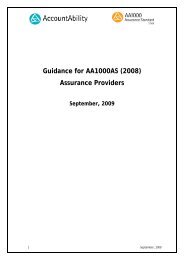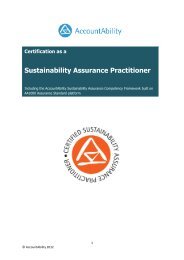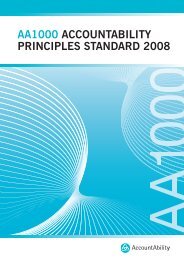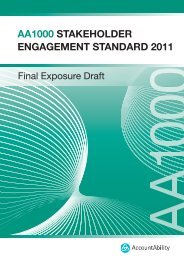The Stakeholder Engagement Manual Volume 2 - AccountAbility
The Stakeholder Engagement Manual Volume 2 - AccountAbility
The Stakeholder Engagement Manual Volume 2 - AccountAbility
Create successful ePaper yourself
Turn your PDF publications into a flip-book with our unique Google optimized e-Paper software.
Analyse and Plan<br />
P8: UNDERSTANDING AND LEARNING ABOUT STAKEHOLDERS AND THEIR REPRESENTATIVES<br />
<strong>Stakeholder</strong>s’ expectations<br />
Knowledge of the issue<br />
Legitimacy of stakeholder<br />
representative<br />
Willingness to engage<br />
Possible impacts (negative or positive)<br />
of the representative<br />
Cultural context<br />
Geographical scale at which<br />
they operate<br />
<strong>Stakeholder</strong>s’ engagement capacity<br />
Relationships of stakeholders with<br />
each other<br />
<strong>Stakeholder</strong> Profi le - Key Issues<br />
<strong>Stakeholder</strong>s will have their own specifi c view regarding an issue, about potential<br />
problems, their causes and solutions. Furthermore, stakeholders investing time in<br />
engaging with you will expect a ‘return on investment’ in terms of action and response.<br />
Try and be as clear as possible about both, the stakeholders’ general view on the issue,<br />
and their expectations towards you. Some stakeholders only expect you to have an open<br />
and honest conversation with them, others may expect you to make specifi c operational<br />
changes or adhere to a certain set of performance standards.<br />
Compare the expectations to what you think you can and want to actually do about an<br />
issue, given your resources and strategic objectives (these ‘margins of movement’ are<br />
further considered in the next step.)<br />
Be clear about the representative’s knowledge of the issue. Some stakeholders know as<br />
much or even more about an issue than you. In such cases, you may wish to learn from<br />
them. Others know far less, and you may want to inform or educate them. This may be<br />
particularly important if their actions can have a strong direct or indirect impact on you,<br />
for example when they infl uence public policy regarding the issue.<br />
When engaging with an individual or an organisation you are often seeking for them<br />
to stand as representative of a larger group of stakeholders. Be clear about any<br />
assumptions or claims about who a representative speaks for. Are they an elected<br />
or recognised representative? Do they have legitimacy in terms of broad support or<br />
acknowledged expertise? Or are you seeking a representative sample opinion from<br />
individuals who refl ect the broader make-up of the community?<br />
Successful engagement requires willingness on both sides. If there is unwillingness,<br />
it is advisable to investigate the reasons for this. Sometimes, this may be due to<br />
circumstances which you can control and change. In other times, it is important to<br />
acknowledge the stakeholders’ right not to engage.<br />
Be clear about the specifi c possible impacts of the stakeholder on your business.<br />
How can s/he contribute to your objectives? How can s/he stop you from achieving them?<br />
When doing this, you also need to consider her/his indirect impacts on you via other<br />
stakeholders.<br />
Some representatives’ potential impacts on you or on the stakeholder engagement<br />
process may be so signifi cant that there is a defi nite necessity to engage them.<br />
Consider the specifi c cultural circumstances of the engagement, e.g. language, customs<br />
regarding social interaction, gender issues. This may be very relevant to the methods<br />
you choose for engagement, as well as to the resource implications. <strong>The</strong> consideration<br />
of cultural issues should ideally be undertaken together with someone familiar with that<br />
culture, whether from within or outside the organisation.<br />
<strong>The</strong> geographical scale at which the representative operates, or is willing to operate,<br />
should match your engagement plans and objectives. Do you need someone who<br />
can engage on a global issue (e.g climate change)? This would require that the<br />
representative organisation possesses a signifi cant degree of credibility, legitimacy<br />
and oversight for this (e.g. WWF). An issue like the environmental considerations in the<br />
building of a new plant, however, is for example more competently addressed with the<br />
local administration and/or community.<br />
<strong>Stakeholder</strong>s must be treated as a scarce resource, which includes the respectful<br />
treatment of their attention and time. Smaller organisations may have very limited<br />
fi nancial means and staffi ng capacity. See Stage 3 for further considerations on<br />
stakeholder capacities.<br />
If you are intending to engage with different stakeholders at the same time, or maybe<br />
even involve them in the same activity or locality, it is important to understand their<br />
views of and relationships with each other. Tension between your stakeholders can,<br />
especially if they are not considered, have very negative infl uences on the outcomes of<br />
your engagements with them.

















